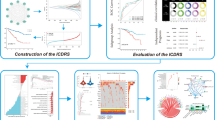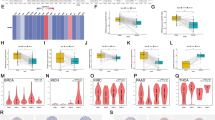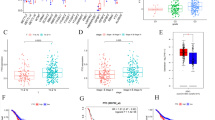Abstract
Background
Identification of novel cancer-specific antigens is important for the advancement of immunotherapy. Our aim was to identify cancer-specific genes in gastric cancer.
Methods
Using cDNA microarray analysis, we detected genes overexpressed specifically in gastric cancer cells. The expression levels of selected genes, including OIP5, was confirmed by real time RT-PCR analysis in tumor/normal paired bulk samples of 58 clinical cases. The expression levels of selected genes in normal tissues were also determined with a human total RNA master panel. We also compared the expression status of OIP5 with that of the other known cancer-testis specific genes.
Results
Twenty-two genes were determined to be upregulated in gastric cancer cells. Among these, three genes (CDC6, Exo1, and OIP5) were selected and confirmed to be upregulated in the tumor tissue compared to normal tissue. A human total RNA master panel demonstrated that OIP5, but not Exo1 or CDC6, showed high specificity in testis. Thus OIP5 may be considered a cancer-testis specific gene. In 58 clinical cases of gastric cancer examined, we found OIP5 gene expression in 27 cases (47%). Thirteen of these 27 cases showed no expression of the known cancer specific genes such as MAGE-1, MAGE-3 or NY-ESO-1.
Conclusions
Using a combination of LMD and microarray, we identified OIP5 as a cancer-testis specific gene. Further expression analysis in a set of clinical cases revealed that OIP5 may be a novel immunotherapy target for patients with gastric cancer.




Similar content being viewed by others
Abbreviations
- OIP5 :
-
Opa interacting protein 5
- CTA:
-
cancer testis antigen
- GAPDH:
-
glyceraldehyde 3-phosphate dehydrogenase
- LMD:
-
laser microdissection
- RT-PCR:
-
reverse transcriptase-polymerase chain reaction
References
Jemal A, Tiwari RC, Murray T, et al. Cancer statistics. CA Cancer J Clin 2004; 54:8–29
Sadanaga N, Nagashima H, Mashino K, et al. Dendritic cell vaccination with MAGE peptide is a novel therapeutic approach for gastrointestinal carcinomas. Clin Cancer Res 2001; 7:2277–84
Gilboa E, Nair SK, Lyerly HK. Immunotherapy of cancer with dendritic-cell-based vaccines. Cancer Immunol Immunother 1998; 46:82–7
Shimizu K, Thomas EK, Giedlin M, Mule JJ. Enhancement of tumor lysate- and peptide-pulsed dendritic cell-based vaccines by the addition of foreign helper protein. Cancer Res 2001; 61:2618–24
van der Bruggen P, Traversari C, Chomez P, et al. A gene encoding an antigen recognized by cytolytic T lymphocytes on a human melanoma. Science 1991; 254:1643–7
Inoue H, Mori M, Honda M, et al. The expression of tumor-rejection antigen ‘MAGE’ genas in human gastric carcinoma. Gastroenterology 1995; 109:1522–5
Inoue K, Ozeki Y, Suganuma T, Sugiura Y, Tanaka S. Vascular endothelial growth factor expression in primary esophageal squamous cell carcinoma. Association with angiogenesis and tumor progression. Cancer 1997; 79:206–13
Tanaka F, Fujie T, Tahara K, et al. Induction of antitumor CTLs with a MAGE-3-encoded synthetic peptide presented by human leukocytes antigen-A24. Cancer Res 1997; 57:4465–8
Fujie T, Tahara K, Tanaka F, Mori M, Takesako K, Akiyoshi T. A MAGE-1-encoded HLA-A24-binding synthetic peptide induces specific anti-tumor cytotoxic T lymphocytes. Int J Cancer 1999; 80:169–72
Wang Y, Wu XJ, Zhao AL, Yuan YH, Chen YT, Jungbluth AA, et al. Cancer/testis antigen expression and autologous humoral immunity to NY-ESO-1 in gastric cancer. Cancer Immunol 2004; 4:11
Laura J. van ‘t Veer, Hongyue Dai, et al. Gene expression profiling predicts clinical outcome of breast cancer. Nature 2002; 415:530–6
Quackenbush J. Microarray data normalization and transformation. Nat Genet 2002;32:496–501
Mori M, Mimori K, Inoue H, Barnard GF, Tsuji K, Nanbara S. Detection of cancer micrometastases in lymph nodes by reverse transcriptase-polymerase chain reaction. Cancer Res 1995; 55:3417–20
Ogawa K, Utsunomiya T, Mimori K, et al. Clinical significance of human kallikrein gene 6 messenger RNA expression in colorectal cancer. Clin Cancer Res 2005; 11:2889–93
Mashino K, Sadanaga N, Tanaka F, et al. Expression of multiple cancer-testis antigen genes in gastrointestinal and breast carcinomas. Br J Cancer 2001; 85:713–20
Jungblunth AA, Stockert E, Chen YT, et al. Monoclonal antibody MA454 reveals a heteroeneous expression pattern of MAGE-1 antigen in formalin-mixed paraffin embedded lung tumours. Br J Cancer 2000; 83:493–7
Sadanaga N, Nagashima H, Tahara K, Yoshikawa Y, Mori M. The heterogeneous expression of MAGE-3 protein: difference between primary lesions and metastatic lymph nodes in gastric carcionoma. Oncol Rep 1999; 6:975–7
Cross SS, Hamdy FC, Deloulme JC, Rehman I. Expression of S100 proteins in normal human tissues and common cancers using tissue microarrays: S100A6, S100A8, S100A9 and S100A11 are all overexpressed in common cancers. Histopathology 2005; 46:256–69
Ji H, Liu YE, Jia T, et al. Identification of a breast cancer-specific gene, BCSG1, by direct differential cDNA sequencing. Cancer Res 1997; 57:759-–64
Bruening W, Giasson BI, Klein-Szanto AJ, Lee VM, Trojanowski JQ, Godwin AK. Synucleins are expressed in the majority of breast and ovarian carcinomas and in preneoplastic lesions of the ovary. Cancer 2000; 88:2154–63
El-Rifai W, Moskaluk CA, Abdrabbo MK, Harper J, Yoshida C, Riggins GJ, Frierson Jr HF, Powell SM. Gastric cancers overexpress S100A calcium-binding proteins. Cancer Res 2002; 62:6823–6
Yanagawa N, Tamura G, Honda T, Endoh M, Nishizuka S, Motoyama T. Demethylation of the synuclein gene CpG Island in primary gastric cancers and gastric cancer cell lines. Clin Cancer Res 2004; 10:2447–51
Heizmann CW, Fritz G, Schafer BW. S100 proteins: structure, functions and pathology. Front Biosci 2002; 7:1356–68
Jia T, Liu YE, Liu J, Shi YE. Stimulation of breast cancer invasion and metastasis by synuclein . Cancer Res 1999; 59:742–7
Pawlak A, Toussaint C, Levy I, Bulle F, Poyard M, Barouki R, Guellaen G. Characterization of a large population of mRNAs from human testis. Genomics 1995; 27:151–8
Ikeda H, Lethe B, Lehmann F, van Baren N, Baurain JF, de Smet C, et al. Characterization of an antigen that is recognized on a melanoma showing partial HLA loss by CTL expressing an NK inhibitory receptor. Immunity 1997; 27:199–208
Boon K, Edwards JB, Siu IM, et al. Comparison of medulloblastoma and normal neural transcriptomes identifies a restricted set of activated genes. Oncogene 2003; 22:7687–94
Oberthuer A, Hero B, Spitz R, Berthold F, Fischer M. The tumor-associated antigen PRAME is universally expressed in high-stage neuroblastoma and associated with poor outcome. Clin Cancer Res 2004; 10:4307–13
van Baren N, Chambost H, Ferrant A, et al. PRAME, a gene encoding an antigen recognized on a human melanoma by cytolytic T cells, is expressed in acute leukaemia cells. Br J Haematol 1998; 102:1376–9
Epping MT, Wang L, Edel MJ, Carlee L, Hernandez M, Bernards R. The human tumor antigen prame is a dominant repressor of retinoic acid receptor signaling. Cell 2005; 122:835–47
Steinbach D, Hermann J, Viehmann S, Zintl F, Gruhn B. Clinical implications of PRAME gene expression in childhood acute myeloid leukemia. Cancer Genet Cytogenet 2002; 133:118–23
Steinbach D, Viehmann S, Zintl F, Gruhn B. PRAME gene expression in childhood acute lymphoblastic leukemia. Cancer Genet Cytogenet 2002; 138:89–91
Tajeddine N, Gala JL, Louis M, Van Schoor M, Tombal B, Gailly P. Tumor-associated antigen preferentially expressed antigen of melanoma (PRAME) induces caspase-independent cell death in vitro and reduces tumorigenicity in vivo. Cancer Res 2005; 65:7348–55
Acknowledgments
We thank Ms. T. Shimooka, Ms. K. Ogata, Ms. M. Oda, Ms. N. Kasagi, and Ms. Y. Nakagawa for their excellent technical assistance.
Author information
Authors and Affiliations
Corresponding author
Additional information
Grant sponsors: CREST, JST; Uehara Memorial Foundation; Japan Society for the Promotion of Science (JSPS) Grant-in-Aid for Scientific Research, grant numbers 17015032, 17109013, 17591411, 17591413, and 16390381; Health and Labour Sciences Research Grants; Third Term Comprehensive Control Research for Cancer, 16271201.
Rights and permissions
About this article
Cite this article
Nakamura, Y., Tanaka, F., Nagahara, H. et al. Opa Interacting Protein 5 (OIP5) Is a Novel Cancer-testis Specific Gene in Gastric Cancer. Ann Surg Oncol 14, 885–892 (2007). https://doi.org/10.1245/s10434-006-9121-x
Received:
Revised:
Accepted:
Published:
Issue Date:
DOI: https://doi.org/10.1245/s10434-006-9121-x




